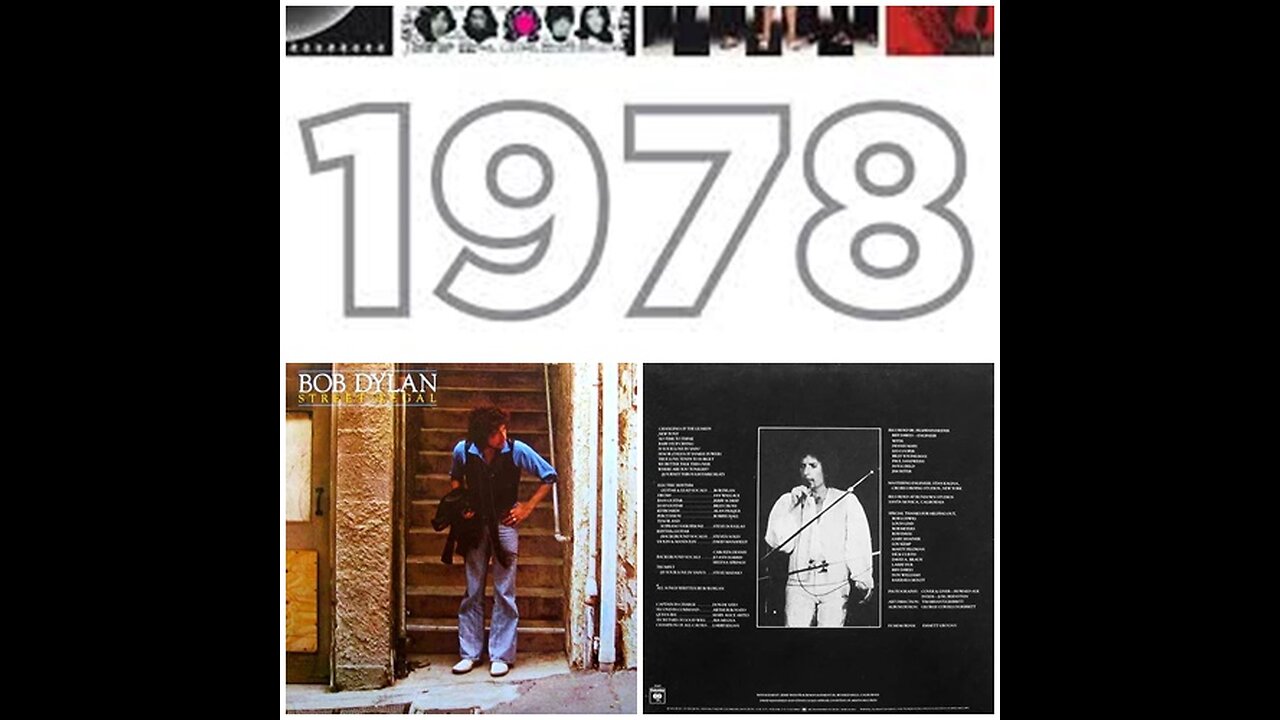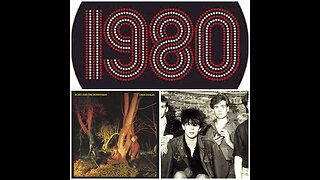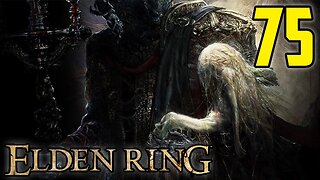Premium Only Content

My Top 20 albums for 1978 No 4
Street Legal 7 ( 1978, UK pos 2 )
Street-Legal is the eighteenth studio album by American singer-songwriter Bob Dylan, released on June 15, 1978, by Columbia Records. The album was a departure for Dylan, who assembled a large pop-rock band with female backing vocalists for its recording.
After receiving positive reviews on his previous album, Desire, Dylan was met with a more lukewarm critical reception for Street-Legal, though the album was still commercially successful, being certified as Gold in the US and Platinum in the UK. Many critics gave the album a more positive re-appraisal following its release in a remixed and remastered edition in 1999.[1][2]
Background
Dylan spent the first half of 1977 engaged in divorce proceedings and a custody battle with his first wife, Sara, while editing Renaldo and Clara, an ill-fated film shot during the fall of 1975 on the first leg of his Rolling Thunder Revue tour. With the summer approaching, Dylan took a break from the film and returned to his farm in Minnesota, where he was accompanied by his children and Faridi McFree, with whom Dylan had started a relationship. There he began writing a new set of songs, including "Changing of the Guards," "No Time to Think," and "Where Are You Tonight?". At least six of the nine songs ultimately included on Street-Legal were written during this time.[3]
His work was disrupted on August 16, 1977, when news broke that Elvis Presley had died at 3:30 p.m. at Baptist Memorial Hospital in Memphis, Tennessee. "I went over my whole life," recalled Dylan. "I went over my whole childhood. I didn't talk to anyone for a week."[3]
Later that fall, another custody battle arose when Sara sought permission from the court to move to Hawaii with their children. The proceedings took Dylan's focus away from the world tour he had been planning, his first in twelve years. He had signed a five-year lease on an old three-story building on the corner of Ocean and Main in Santa Monica, California. Dubbed 'Rundown', the building was soon converted into a rehearsal space and studio. By September, the building was staffed by Joel Bernstein and Arthur Rosato, two engineers who had been in Dylan's road crew in 1976.[4]
Before rehearsals could begin, Dylan had to assemble a band. He quickly contacted several musicians, including former Rolling Thunder Revue members Steve Soles, David Mansfield, Rob Stoner, and Howie Wyeth. Stoner recalls, "I thought the Hard Rain thing was the last I'd ever hear from Bob ... Then suddenly I get this call - I think Bob called me up personally ... and asked me to bring Howie, and a couple of other people, to L.A. to 'just try some things out.'"[3]
Soles, Mansfield, Stoner, Wyeth, pianist Walter Davis, Jr., and percussionist Otis Smith arrived in late November and early December. His players were assembled, yet Dylan was still not ready to rehearse, with the custody battle over his children and the imminent release of Renaldo and Clara occupying most of his attention, making edits on Renaldo and Clara up to the last minute. "Bob kept us sitting around for a week or two," recalls Stoner. "He just never showed up ... and [when he finally] drops in, he's distracted ... He was really [stressed out]. He was always bummed out. He was chain-smoking and he was really in a bad mood. He was short with people. It just wasn't working out."[3]
A settlement in his custody battle was reached in late December, decreeing that his children would remain in California, with Dylan retaining partial custody. Fallout from the custody battle would keep Dylan and Sara from reaching amicable terms for several years.[4] Meanwhile, Renaldo and Clara was released to widespread negative reviews. Though disappointed with the critical reaction, with the film released and his legal matters settled, Dylan was finally ready to rehearse.[5]
Sessions soon began in earnest. On December 26, Dylan followed the day's rehearsals with a preview of his next album. Accompanying himself on piano, Dylan played his new batch of songs for Stoner, Soles, and Bernstein. Many of these songs had been written that summer at his farm in Minnesota. As rehearsals progressed, it soon became clear the band wasn't "picking up where the Rolling Thunder Revue left off," as Mansfield recalled. "I brought my steel guitar and I had it in rehearsal and every time I'd go to start unpacking it, Bob would go, 'We don't need that.' All of a sudden the instrument that I played all over the place in the previous band, he didn't want to see it, let alone hear it."[4]
Howie Wyeth soon left the band. Wyeth had been struggling with a heroin addiction at the time, recalling, "I knew I couldn't get high once we'd left [for tour] ... I realized I was either gonna get busted or I'd end up being tortured to death. So I literally had to just tell Bob one night, 'I can't do it.' That was terrible. He had his own problems. He felt bad that I wasn't gonna do it, and he called me up when I got home to New York and said, 'Are you sure?'"[3]
After auditioning a number of drummers ("maybe ten or a dozen" by Bernstein's estimates), Dylan replaced Wyeth with Denny Seiwell, who briefly played with Paul McCartney and Wings.[5]
When rehearsal was held on December 30, the band now included Stoner, Mansfield, Soles, guitarist Jesse Ed Davis, and singers Katey Sagal, Debbie Dye Gibson, and Frannie Eisenberg. This rehearsal was mostly dedicated to rearrangements of classic Dylan compositions, drawing on adult contemporary pop. (Wayne Newton, Barry Manilow, Marvin Hamlisch). As biographer Clinton Heylin writes, "[Dylan] began to impose a grander vision on whatever sound the Revue veterans had initially conceived. With his love of fatback R&B, it should have come as no surprise that he hankered after a band with a saxophone player and female singers ... The band he assembled in the two months before the 1978 world tour shares many similarities with the big band he had attempted to impose on Desire. The girl singers/sax/keyboards combination also reflected elements of the extravagantly presented shows Presley had been playing in the 1970's."[5]
By mid-January 1978, Dylan was still unsatisfied with some aspects of the band. With the first leg of his world tour set for February in Japan, he quickly made some last-minute changes, removing Sagal and Eisenberg and replacing them with novice singer Helena Springs and seasoned professional Jo Ann Harris. (Sagal was not surprised by her dismissal. "I remember ... he'd have three girls all sing a part that was not in our range," Sagal recalls, "and we were too terrified to say anything.")[5]
In the meantime, Seiwell was let go; during his brief stint with Wings, he and the rest of Wings were busted for drug possession in Sweden, prompting Japanese officials to deny him an entry visa. A number of auditions were quickly arranged, and according to Stoner, they "settled" on former King Crimson drummer Ian Wallace. Although Wallace's drumming would become problematic ("The man had a beat like a cop," recalls Stoner), time had run out as the tour was almost upon them. The Danish/American guitarist Billy Cross was also brought in and eventually Dylan's touring band was solidified with Cross, Wallace, keyboardist Alan Pasqua, percussionist Bobbye Hall, and saxophonist Steve Douglas, Mansfield, Stoner, Soles, and the back-up singers.[5]
In the final two weeks of rehearsal Dylan began settling on new tour arrangements for his classic, earlier recordings. Rob Stoner recalls, "a telegram arrived from the Japanese promoter, and in it he had a manifest of the songs he expected Bob to do on this tour. In other words he was a jukebox, he was playing requests. "We don't want you coming here and doing like your new experimental material, or getting up there and jamming." As Heylin writes, "though the idea of a big band had always appealed to Dylan, the reality was a whole series of new arrangements, to make each song different and to highlight the band's demonstrable versatility ..." Often the arrangement ideas came from the band. As Stoner observed, when they put these arrangements to Dylan, "Sometimes he'd like it and he'd use it, and other times he'd say, 'Forget it'."[3]
The band flew to Japan on February 16, 1978, and the tour drew considerable praise from the audience and press, in both Japan and Australia. Later documented on Bob Dylan At Budokan, this tour was marked by bold new arrangements of classic Dylan recordings. During the course of these two-hour-plus shows, Dylan often recast familiar songs in more contemporary guise. However, some of the band members, including Stoner, were not entirely satisfied with Dylan's new sound. "He had in mind to do something like Elvis Presley," recalls Stoner. "That size band and the uniforms ... he wasn't very sure about it, which is why he opened way out of town. I mean, we didn't go any place close to Europe or England or America [for] forever, man ... and I don't blame him. I think he knew, subconsciously, he was making a big mistake."[3]
The tour ended on April 1 at the Sydney Sportsground in Australia. When it was over, Stoner informed Dylan that he was leaving the band. Dylan was planning to record his next album upon returning to Los Angeles, but with Stoner gone, Dylan hired a new bass player, Jerry Scheff. Scheff was best known for his work with Elvis Presley in the 1970s as a member of his TCB Band, and on The Doors' final recordings.[3]
With Scheff replacing Stoner, Dylan began recording his new material with his touring band. Sessions were held at Rundown, with Dylan renting a mobile truck to record the proceedings. (The mobile truck was equipped with 24-track capabilities, something his studio didn't have.) "I didn't want to do it there," Dylan later recalled. "[I] couldn't find the right producer, but it was necessary to do it. So we just brought in the remote truck and cut it, [and] went for a live sound." Dylan would ultimately settle on Don DeVito as his producer, even though he had been dissatisfied with DeVito's work on Desire.[5]
Dylan already had a European tour scheduled for June, but he still had enough time to record his album; over the course of just four days, Dylan would record nine of his own compositions. Dylan knew exactly which songs he wanted to record, and though three songs written by Helena Springs were also recorded during these sessions ("Coming from the Heart," "Walk Out in the Rain," "Stop Now"), there is no indication that these songs were ever serious contenders for the album.[5]
Though the sessions lasted only four days, they were plagued with issues stemming from recording in a makeshift rehearsal space instead of a studio. "The biggest problem ... was how it was recorded," recalls Mansfield, "with Bob getting impatient with the engineering assistants ... baffling and checking levels and getting sounds in sync ... and the recording crew just having to scramble to get mikes into place and get something on tape, while we were playing the thing the few times we were gonna play it. It really was sort of like Bob Dylan meets Phil Spector in the best way ... as if it had [just] been recorded so the instruments sounded full and well-blended."[3]
Outtakes
Unlike previous albums, the outtakes for Street-Legal are few in number. Only three additional songs were recorded for the album, of which none have seen release. There are two takes of "Stop Now", sounding very much like an additional Street-Legal song, in circulation. The Searchers recorded "Coming From The Heart (The Road Is Long)" and Eric Clapton released "Walk Out In the Rain" on his album Backless, which also included another song written at this time, "If I Don't Be There By Morning".[citation needed]
"Coming from the Heart (The Road Is Long)" (Bob Dylan and Helena Springs)
"Stop Now" (Bob Dylan and Helena Springs)
"Walk Out in the Rain" (Bob Dylan and Helena Springs)
Other songs written during this time include:
"Am I Your Stepchild"
"If I Don't Be There By Morning" (Bob Dylan and Helena Springs)
"Legionnaire's Disease"
"Love You Too Much" (Bob Dylan and Greg Lake)
Following the twin successes of Blood on the Tracks and Desire, Street-Legal was another gold record for Dylan, peaking at No. 11 on the U.S. Billboard charts, making it his first studio album to miss the U.S. Top 10 since 1964. However, it became his best-selling studio album in the UK, reaching No. 2 on the charts (his highest position in eight years) and achieving platinum status with 300,000 copies sold (the only other Dylan album to do this is The Essential Bob Dylan).[citation needed]
When Street-Legal was released, it was dismissed by the American press. Crawdaddy! critic Jon Pareles remarked that "Dylan still needs a producer," but others found fault with both the songs and the performances. Greil Marcus criticized the singing as "simply impossible to pay attention to for more than a couple of minutes at a time" and accused "Is Your Love in Vain?" of sexism, claiming Dylan was "speak[ing] to the woman like a sultan checking out a promising servant girl for VD."[citation needed]
In the UK, reviews were positive, with Michael Watts of Melody Maker proclaiming it Dylan's "best album since John Wesley Harding". NME's Angus MacKinnon hailed it as Dylan's "second major album of the 70s." In contrast to the record's still mixed reputation, Q Magazine has given the album a 5 star rating on re-release on two occasions, pointing out that the original muddiness of the production was part of the reason the record has so long been critically overlooked.[citation needed]
When Dylan embarked on his European tour, he would be greeted by a generally warm audience reception, and his single, "Baby, Stop Crying" (the lyrics of which were allegedly inspired by Robert Johnson's "Stop Breaking Down"), charted in the top ten throughout Europe, and reached number 13 on the UK Singles Chart with the album peaking at number 2 on the album chart. In the US, however, the single failed to crack the top 100 and the album itself peaked at number 11, ending Dylan's string of number 1 albums in America until 2006's Modern Times. When Dylan continued his tour in America, it was derided by the American press as the Alimony Tour and later the Vegas Tour, much to Dylan's chagrin.[citation needed]
Many years later, even Street-Legal's most ardent admirers would admit some flaws in the album, finding most fault with the production. "Street-Legal was the first in a long line of song collections whose failure to be realized in the studio would lay a 'dust of rumors' over Dylan as an abidingly creative artist that he has never been able to fully shake," writes Heylin.[citation needed]
This LP was pressed at the same time as a Pink Floyd, "Wish You Were Here" 1978 repress was being prepared, so many (exact quantity unknown, possibly 300 per stamper) of LP's marked Pink Floyd "WYWH" actually contain side one of Street-Legal by Bob Dylan.[citation needed]
The original 1978 LP sleeve credits mastering to Stan Kalina at CBS Recording Studios NY; the album was produced by Don DeVito. In 1999, DeVito revisited Street-Legal and remixed the album with modern, digital techniques in an attempt to improve the mix and produce a richer overall sound. The remix was also used in a 2003 SACD reissue of Street-Legal. However, in 2013, when Street-Legal was remastered as part of The Complete Album Collection Vol. 1, the original 1978 Kalina mix was reinstated.[citation needed]
Track listing
All tracks are written by Bob Dylan
Side one
1. "Changing of the Guards" April 27, 1978 6:41
2. "New Pony" May 1, 1978 4:28
3. "No Time to Think" April 27, 1978 8:19
4. "Baby, Stop Crying" April 28, 1978 5:19
Total length: 25:10
Side two
1. "Is Your Love in Vain?" April 28, 1978 4:30
2. "Senor (Tales of Yankee Power)" April 28, 1978 5:42
3. "True Love Tends to Forget" April 27, 1978 4:14
4. "We Better Talk This Over" April 26, 1978 4:04
5. "Where Are You Tonight? (Journey Through Dark Heat)" April 27, 1978 6:16
Total length: 24:46
Personnel
Musicians
Bob Dylan - vocals, rhythm guitar
Steve Douglas - tenor saxophone, soprano saxophone
David Mansfield - violin, mandolin
Alan Pasqua - keyboards
Billy Cross - electric guitar
Steven Soles - rhythm guitar, background vocals
Jerry Scheff - bass guitar
Ian Wallace - drums
Bobbye Hall - percussion
Carolyn Dennis, JoAnn Harris, Helena Springs - backing vocals
Steve Madaio - trumpet on "Is Your Love in Vain?"
Technical personnel
Don DeVito - "Captain in Charge"
Biff Dawes - engineering
Stan Kalina - mastering engineer at CBS Recording Studios in New York City
Michael H. Brauer, Ryan Hewitt - remixing engineering (1999 edition)
Filmways/Heider - recording studio
Mary Alice Artes - "Queen Bee"
Larry Kegan - "Champion of All Causes"
Ava Megna - "Secretary of Goodwill"
Arthur Rosato - "Second in Command"Changing Of The Guards / New Pony / No Time To Think / Baby, Stop Crying / Is Your Love In Vain? / Senor (Tales Of Yankee Power) / True Love Tends To Forget / We Better Talk This Over / Where Are You Tonight? (Journey Through Dark Heat)
The group of musicians surrounding Bob for 'Desire' had gone. The brief period of reconcilliation between Bob and his Wife around the period of 'Desire' had gone. This album was recorded inbetween tours with a hurriedly assembled band. So, the sound is hardly as rich as 'Desire'. The songs are a step down in quality as well though. Nothing like 'Blood On The Tracks' here. Well, maybe a couple songs are worthy, cut from the same cloth. Not too much else though. And, another thing! This record seems to bear comparison with 'New Morning'. It shares gospel backing vocals for one. It shares a certain sense of murkiness. 'Senor' stands out a mile, however. For some reason, not only is it the finest song here from a writing point of view, but it also has a richer, clearer sounding backing track in addition to a fine Dylan vocal. The other clear standout if we are talking 'classic' Dylan is the opening 'Changing Of The Guards'. Yeah, the sound is slightly murky, but we have a brass section! Well, a trumpet or two, at least. We have a brilliantly impenetrable set of poetic lyrics and a fine melody to boot. Of course, nothing else comes close to the quality of these two songs, but even with the lack of new ideas displayed across this records nine songs - it remains an enjoyable listen. 'New Pony' manages to be funky and the gospel backing vocals work especially well here. 'No Time To Think' may have been amongst the earliest songs written for this record, bearing the closest comparison to anything from 'Desire'. It's a fine, enjoyable song that stetches out over eight minutes and even includes a violin! 'Baby Stop Crying' was released as a single and even charted in modest fasion. Bob does well vocally through this song.
'Is Your Love In Vain' sees Bob doing a tender, rather affecting vocal, although the music is nothing to write home about. Following the superlative 'Senor' we have a few catchy melodies with 'True Love Tends To Forget'. Neither of these songs say anything lyrically however and although manages to be pleasant - aren't much more than that. 'We Better Talk This Over' has an enjoyable rhythm about it but again, seems to much like standard material. The closing 'Where Are You Tonight' apparently presages his early eighties material. In short, It's bland and poorly produced. Bobs method of recording quickly, capturing a mood - simply wasn't working now that recording studios had gotten more complex. Plus, even more worringly, the new songs he was writing in the wake of 'Street Legal' were incredibly banal. Salvation was at hand! During one concert date for the 'Street Legal' tour somebody threw a small silver cross onto the stage...
Steven Sroczynski SSroczynski@foleyhoag.com
An underrated album. "Changing of the Guards" stands as one of Dylan's best songs EVER. The background vocalists certainly aren't as unique or astonishing as Emmylou Harris, but they are strangely captivating in their own way, and I think they harmonize well with Dylan (or as well as anyone ever has). The album really doesn't contain any filler from where I'm looking. "Senor" and "No Time to Think" are the next best songs in my opinion but the rest are all pleasant and melopdic. A lot of people blast "New Pony." Well, it is one of Dylan's more...weird songs, on par with the likes of "If Dogs Ran Free" and "Man Gave Names to all the Animals." It's certainly not a great song, but again, I think it's alot of fun and you gotta appreciate the extended sax solo at the end. As an album, I find Street-Legal noteworthy for sounding very uplifting, with a couple exceptions. I call it Dylan's only "party album" because it sounds very upbeat and partyish, unlike most of his catalog.
stephen szenderski phyzeke32@aol.com
where are you tonight IS!!!! Bob Dylan's best song, it has such a good feel to it and i can't get enough of it, the rest of the album is good too, but that song definitely is a standout, way underrated
Glenn Gerhardt glenngerhardt@adelphia.net
i totally agree that where are you tonight is a highly underrated song. it has a "like a rolling stone" feel to it, and i think its wonderfully written. in fact, all of the songs on this album are wonderfully written with the possible exception of "true love tends to forget". i would group this album in with "blood on the tracks" and "desire" as part of dylans creative burst of the mid 70s
Magnus Wistrand magnus@otenet.gr
Not much wrong with the songs -I'd rather wish the superior live '78 versions from Europe were released.
philip bellew pjbellew@hotmail.com
I agree that the original recording of Street Legal suffers from turgid production values which ultimately let the album down - however, the recently cleaned-up CD version is a vast improvement and brings a lovely crisp clarity to the songs. Where Are You Tonight is surely one of Dylan's finest achievements: the lyrics are staggering, and the arrangement - drawn from the same well-spring as Like A Rolling Stone - seems to me to be perfect.
Graham Ashmore gdashmore@yahoo.ca
This record has gained from remastering as much as any I've ever heard. What an album - to these ears, four major songs, which may be as many as on Time Out of Mind. Of the four, "Where Are You Tonight" is the one I hadn't noticed on vinyl. The filler is solid, though "Baby Stop Crying" can be wearisome, and the chorus of "Is Your Love In Vain?" makes for a wince (which isn't to suggest there's anything wrong with cooking, sewing, or horticulture!). "New Pony", which I used to hate, is very sexy and great fun. And "Guards", "Senor", and "No Time to Think" are something more, which has been recognized in other comments.
Bradlee burtner2000@yahoo.com
You do a great job with this...but 'Where are you tonight' is the album's best song. 'Senor' is a bore...just b/c something is in a minor key and has imagistic lyrics does not automatically make it artistic or interesting or instant-classic. By the time Dylan unassumingly mentions the stripper in 'Tonight', the song's a gem. If anyone else had written this song, people would be calling it a CLASSIC. It's better than ANYTHING Tom Petty has ever written, etc.
gazza garyhess44@hotmail.com
I know this got slated at the time but its 3rd equal with oh mercy for me . Nothing wrong with the quality of the writing - guards,where are you tonight,senor , baby stop crying - like wow . bobs vocals go a bit "off" at times and the production was criminal , but in my eyes its still up there among dylans great albums . i mean where are you tonights lyrics sound simultaneously painful and joyful , gospel and dirty rock n roll .
-
 8:28
8:28
JohnVicarysMusicPassions
1 month agoMy Top 20 albums of 1980 No 12
182 -
 20:55
20:55
Degenerate Plays
21 hours ago $0.66 earnedI Wasn't Expecting This... - Elden Ring : Part 75
12.4K2 -
 23:13
23:13
CatfishedOnline
15 hours agoMan Cheats on Wife for Adult Actress Scammer
26.5K11 -
 14:09
14:09
NinjaGamblers
22 hours ago $0.95 earnedHow to Win at Roulette $250 in 6 minutes with Fibonacci Corner Bets
13K9 -
 49:00
49:00
State of the Second Podcast
17 hours agoBeginners Guide to Stacking Gold & Silver (ft. United Patriot Coin)
21K2 -
 8:40
8:40
The Lou Holtz Show
18 hours agoLou Holtz Slams Open Borders: "Do the Right Thing—Keep Americans Safe!
14.2K5 -
![[Ep 630] Election Integrity w/ Guest Steve Stern! | Sam Anthony [your]NEWS | Laura Loomer Delivers!](https://1a-1791.com/video/fww1/23/s8/1/G/S/8/t/GS8ty.0kob-small-Ep-630-Election-Integrity-w.jpg) 3:04:33
3:04:33
The Nunn Report - w/ Dan Nunn
17 hours ago[Ep 630] Election Integrity w/ Guest Steve Stern! | Sam Anthony [your]NEWS | Laura Loomer Delivers!
27K12 -
 11:33
11:33
Russell Brand
19 hours agoThe Democratic Party is Becoming A Parody
120K260 -
 26:17
26:17
The Brett Cooper Show
1 day agoWhy Trans Activists Are Attacking This Gym Owner | Episode 14
111K84 -
 42:04
42:04
Film Threat
21 hours agoSNOW WHITE EARLY REACTIONS! | Film Threat After Dark
67.9K14